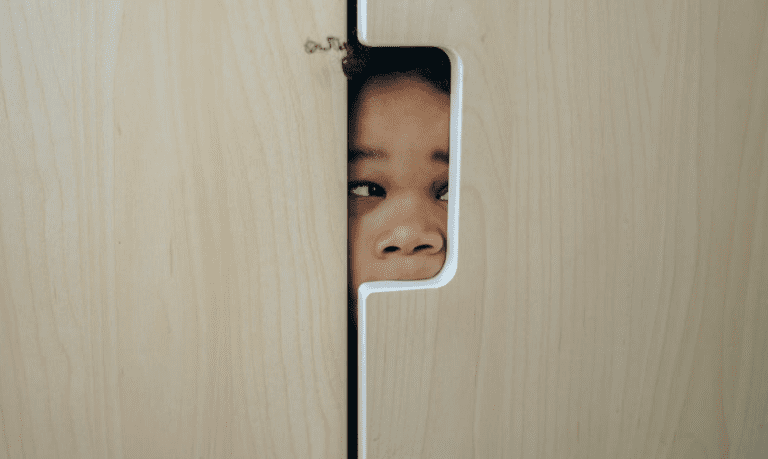
Why Does My Child Hide In The Closet? 11 Possible Causes
- Created:
28. 2. 2023 - Updated:
11. 6. 2024
Now:
Parenting is a mix of all professions. One minute you’re a superhero the next minute you are a detective or a psychologist trying to understand them.
Along the way, your child may develop some weird behaviors that can make you worried. Considering that most of the time they can’t express themselves, you are left to figure out what’s normal and what is not normal.
In this post, I am answering the question, why does my child hide in the closet? I will go through the possible reasons why children like doing this and when you should be concerned.
Why Does My Child Hide In The Closet?
There are a number of reasons why your child could be hiding in the closet. It could be when they are scared, anxious, or stressed. A child could also be looking for privacy or hiding their emotions. Sometimes, it could be that they love the closet and they are just being adventurous.
Let’s now talk about each of these causes in detail.
11 Possible Reasons Why Your Child Hides In The Closet
1. Adventure and Exploration
Now:
Toddlers, babies, and school-going children are always looking for their next escapade. It’s their way of learning and exploring the world around them.
Sometimes, their adventure is hiding in the closet. This is common if the closet has something interesting going on.
It can be a mirror, various clothing items, or just the darkness and silence in the closet. To know whether it’s an adventure taking them into the closet, observe their behavior.
They are just being cheeky if they are hiding to wear your buggy shoes or mess with your makeup gear.
If they retreat into a corner in silence or look scared, something is amiss.
It could be one of the other causes I am going to discuss below.
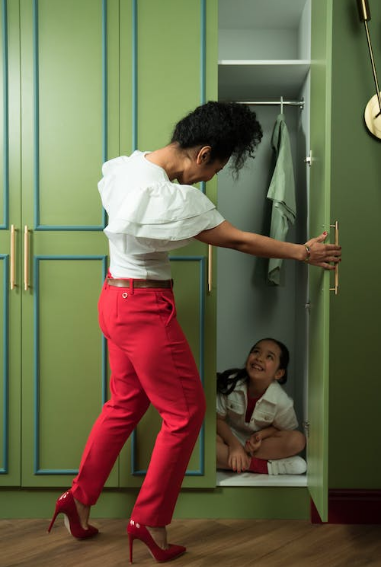
2. When Feeling Anxious
A child may also start hiding in the closet when they are feeling anxious. They develop a tendency to hide there as a coping mechanism to deal with these big feelings.
This study, published in the National Library of Medicine found that toddlers as young as 1 and 2 years old can develop anxiety symptoms.
While this study, also published on the same site, found that 3-year-old children are often more anxious than 4- and 5-year-olds.
Now:
Anxiety in children is triggered by various things depending on a child’s age and the environment.
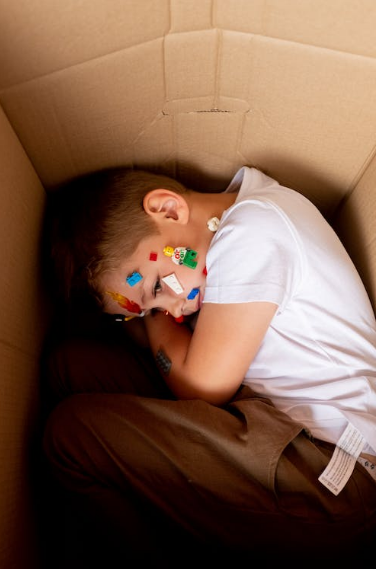
Some types and causes of anxiety in kids include:
- Social anxiety when a child may feel anxious when there are unfamiliar people at home.
- Separation anxiety. This occurs when a parent or caregiver leaves the child behind.
- A child may also feel anxious when being left with an abusive parent, relative, or caregiver.
- Anxiety may also be caused by a phobia of different real and imaginary creatures such as monsters.
In this case, the closet provides the child a sense of safety and control. This is similar to when adults retreat into a closets when they feel anxious, upset, or worried.
The dark, cool, and quiet atmosphere in a closet provides some sort of safety. Small spaces also feel safe, comforting, and calming to some people, including kids.
3. When Stressed
Now:
Hiding in the closet may also be a coping mechanism for a child who is feeling stressed. While a little bit of stress is healthy for kids and adults, too much stress is harmful to well-being.
Just like when a child is anxious, a constantly stressed child may start hiding in the closet to cope with the stress.
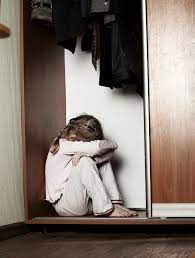
The specific stressor(s) will depend on the child’s age and the environment. According to MedlinePlus childhood stress is caused by issues such as
- Bullying
- Changing schools
- Negative thoughts
- Parental issues such as separation or divorce
- Physical body changes
A stressed child will also have other behaviors and symptoms that are associated with stress. This includes
- Decreased appetite
- Anxiety
- Anger
- Crying
- Aggressive behavior
- Defiance
- Depression
- Withdrawal symptoms
If the child is old enough to have a conversation, talk with them, and they may open up to you. Most importantly, provide a safe and secure home for your child.
This 10-year-old survey by the American Psychological Association found that most parents can’t tell when their children are stressed.
4. A Sign Of A Disorder
Now:
Finding solace in tight, small, and enclosed spaces such as a closet is also connected to specific disorders.
For instance, some autistic adults tend to retreat into tight spaces when they are feeling hypersensitive. To them, tight and small spaces help provide some sort of deep-pressure therapy.
So, a child hiding in tight and small spaces may also be a sign of a disorder such as autism. This study published in the National Library of Medicine studied the hug machine and found it helped autistic children relieve anxiety and tension.
The hug machine stimulates in the same way that tight spaces do.
Caution
An autism spectrum disorder diagnosis can only be given by a trained specialist such as a child psychologist, developmental pediatrician, speech-language pathologist, or occupational therapist.
While it’s okay to suspect your child may have autism, don’t label them or their behaviors as autistic, until they have been diagnosed.
Something else:
There are people who derive pleasure in small and tight places. This condition is called claustrophile; the love of small enclosed places.
Note:
Claustrophile is the opposite of claustrophobia, which is the fear of confined spaces.
5. Imitating What They Watched In A Video Or Someone Doing
This is interesting:
A child may also hide in the closet to imitate what they saw someone else doing. Toddlers and children learn and communicate through imitation of behaviors.
This study published on ScienceDirect found that 2-year-old kids could replicate a behavior they saw on a video even after 24 hours had elapsed.
The study also found that kids are more likely to imitate behaviors they watch on a new gadget than on their family TV.
If your child suddenly starts hiding in the closet, investigate what they have been watching. It may be something they watched in a cartoon video.
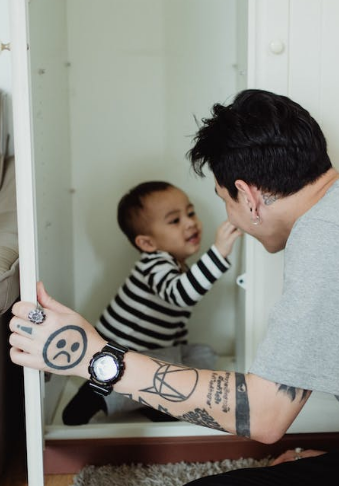
The trick here is to observe any accompanying behavior when they are there. For instance, saying specific words or doing something specific. That can help you get a clue as to where they saw this behavior.
Also, check if it’s happening immediately after watching a specific video.
6. To Hide Their Emotions
You are probably familiar with this one.
People have different ways of handling their emotions. Some people, including some children, hide when they feel negative emotions.
This is very common for children when they feel anxious, sad, ashamed, or guilty. A study published in the National Library of Medicine showed children as young as 2 years old experience guilt and shame.
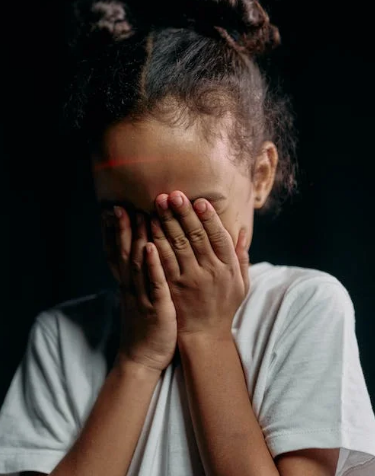
Some possible reasons why a child would hide emotions instead of being vulnerable include
- When they don’t feel safe
- When they don’t want to show weakness
- To protect themselves from getting hurt
- When they feel their opinions and feelings are not validated
- Not being confident
If you notice your child retreating into the closet to hide their emotions, assist them in expressing themselves and regulating their emotions.
Of course:
You have to win their trust and provide a safe space.
7. Fear When They Are In Trouble
What would you do if you knew you were in trouble?
While there are the few aggressive ones who would fight back, the majority of people would stay away
Now:
Since children can’t fight back, they resort to hiding when they know they are in trouble and may be punished.
A child will then find a space to hide, which can be a closet or other places in the house where they think it will be hard to find them.
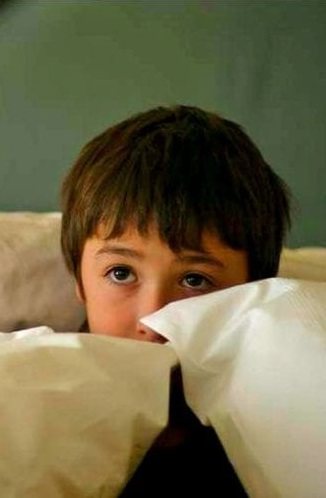
According to this study, published in the National Library of Medicine, a child may start hiding out of fear at 18 months. This is because, at this age, they can understand rules and responsibilities.
A child can understand the consequences of their actions by the second year.
Other instances where a child would hide because of fear include
- After watching a scary cartoon or video
- When parents or older siblings are watching something scary
- When parents are arguing or screaming at each other
- When a parent they fear is around
- When a relative or visitor they fear is at around
- When something tragic happened at home such as the death of a loved one
8. When They’re Uncomfortable About Something
The closet may also be the perfect hiding spot when a child is uncomfortable about something that is out of their control.
This can be
- noise
- light
- a lot of movements
- visitors
- responsibilities
- restriction of handheld devices
- Boredom
This usually happens when the child gets triggered.
9. Shyness and Loneliness
A shy and lonely child may also start hiding in tight spaces such as the closet. While shyness is common in young kids, most typically warm up after some time.
Children with extreme shyness will retreat into staying in confined spaces to get a sense of safety.
Rejection, exclusion, and bullying can aggravate shyness behaviors, making it even more difficult for such children.
10. When They Don’t Want To Talk
Another possible reason why a kid will hide in the closet when they don’t want to talk. This is common when there is excessive interrogation about their life.
It can also happen when there are many people in the house and they feel overwhelmed.
11. If Not Allowed To Close The Bedroom Door
Children who are not allowed to close the door when in the bedroom also develop a tendency to hide in the closet.
Just like adults, children require a safe space where they can feel in control. Sometimes, this can be the bedroom.
However, when they lose control of their bedroom, they may start hiding in the closet when they just want to be alone.

Tips To Identify Why Your Child Is Hiding In The Closet
1. Age
Now:
Depending on the age of your child, they may help you figure out why they hide in the closet. If you have a close relationship, they may open up to you if something is wrong.
However, older kids may make up a reason. This is mostly the case if you are the reason why they go hiding,
A child may also say they don’t have a reason, and this may be true. There could be an underlying issue, but the child may be doing it unconsciously.
For toddlers, there is a higher probability that they are just being adventurous. However, pay close attention to how they behave when they are in there.
2. Frequency, Timing, and Pattern
Another consideration when investigating why your child is hiding is the frequency, timing, and pattern.
- How many times does the child hide in a day?
- When does it happen?
- Is there a pattern?
For instance, do they only hide when a specific person is around? Do they hide after coming from school?
If they only hide when a specific parent or relative is around, it may be fear or something worse like abuse.
When parents are watching a movie, they may be scared. If it’s immediately after school, maybe they are overwhelmed and stressed by the school.
Use these questions to help you connect the dots.
3. Behavior
This one is very key.
How the child behaves in the closet can help you narrow down the causes.
For instance, does the child stay quiet? Are they playful? If they are playing when they are inside, maybe the closet is their favorite spot in the house.
This may also be the case if they are shouting and talking to you.
However, if they are staying quiet, covering themselves with blankets or clothing, there may be something deeper.
This is the same case if they don’t want anyone to know they are in the closet and won’t respond when you call their name.
If they lock the door from the inside and switch off the lights, there may be something deeper worth investigating.
If the child only hides when a specific parent or person is home. Dig deeper to know why.
Note:
Some toddlers also hide when they want to poop or pee. This is a common behavior that indicates they are aware they are pooping.
4. Medical Condition
Has your child been diagnosed with a condition such as autism or Aspergers?
That may be the cause.
The best thing is to talk with your doctor to know if that is related to the condition. If your child has not been diagnosed, don’t label this behavior as “autistic” until they are diagnosed by a specialist.
Beware of social media content that labels these behaviors as a sign of autism.
What Does Science Say About Children Hiding In The Closet?
Unfortunately, there hasn’t been a scientific study done specifically on why kids hide in the closet. Luckily, there are a lot of studies on children’s behaviors and emotions that we can reference.
We can also draw from our own experiences when we were young. What could have made you hide in the closet?
Conclusion
Hiding in the closet is common behavior with children of all ages. For some, especially toddlers, it may be a way to explore. For bigger kids, hiding in the closet can be a sign of stress, fear, disorder, or just a way to escape reality when they need a break.
Talk with the kid to know what is going on. Most importantly, observe their behavior when they are hiding. If the child looks lonely, scared, or stressed, talk with them. If the kid is being adventurous, it’s okay to let them be.
Final Tip: Keeping a Watchful Eye with Annie Baby Monitor
As a parent, you know how important it is to keep an eye on your kiddo.
That’s where the Annie Baby Monitor comes in.
This app has some helpful features that let you watch your little one in real-time.
Whether the child is playing, exploring, or even hiding in the closet (admit it, we’ve all been there), you can rest easy knowing that you’ll be able to see and hear what’s going on in the room.
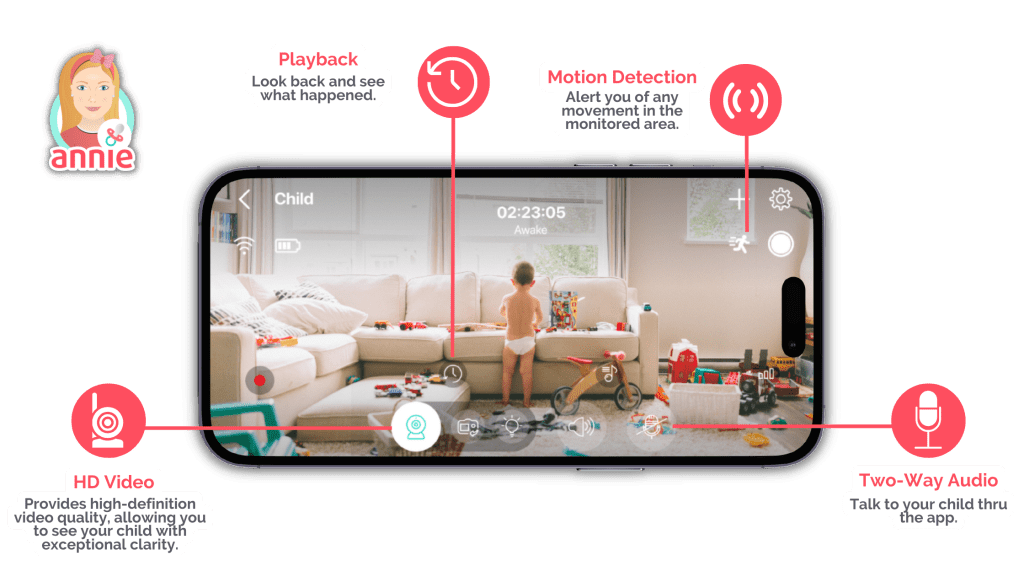
The best part?
The Annie Baby Monitor is more than just a baby monitor. It’s like your trusty sidekick that helps you create a safe and secure environment for your kiddo.
So, if you want to be able to keep tabs on your child and handle any situations quickly and easily, the Annie Baby Monitor is the way to go.
Frequently Asked Questions
There are many reasons why children love hiding things, including
– Thinking hiding things is a game
– When they feel they own something
– When they know you will take the item away
– It can also be a form of seeking attention
A child may hide when they are upset if they have been shamed for getting upset about something.
Hiding when upset may also be a coping mechanism for dealing with the feeling.
Yes, hiding is normal and common for children of all ages. Sometimes they will hide when they want to do sneaky things, such as eating your lotion or messing with your stuff.
They will also hide when they gain access to restricted areas, such as the kitchen.
If your kid has hidden something here are some places you should check:
– Inside potted plants
– Under or beside the couch
– Inside stuffed a stuffed animal
– Tight corners
– In the trash can
– Inside other objects
– Behind a curtain
– In a window sill
Basically, anywhere they can reach their hands.






